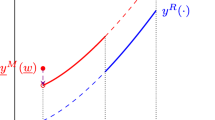Abstract
This paper proposes and analyzes a model of how the behaviorof voters and that of potential party activists togetherdetermine party membership and the ideological characteristicsof party platforms. Membership decisions are based onexpressive motivations, whereas platforms are chosenstrategically. Part of the ideological spectrum may remainoutside both parties because of alienation or indifference.
Similar content being viewed by others
References
Aldrich, J. (1983a). A Downsian model with party activism. American Political Science Review 77: 974-990.
Aldrich, J. (1983b). A spatial model with party activists: Implications for electoral dynamics. Public Choice 41: 63-100.
Alesina, A. (1988). Credibility and policy convergence in a two-party system with rational voters. American Economic Review 78: 796-805.
Anderson, S.P. and Glomm, G. (1992). Alienation, indifference and the choice of ideological position. Social Choice & Welfare 9: 17-31.
Baron, D.P. (1994). Electoral competition with informed and uninformed voters. American Political Science Review 88: 33-47.
Brams, S.J., Jones, M.A. and Kilgour, D.M. (2002). Single-peakedness and disconnected coalitions. Journal of Theoretical Politics 14: 359-383.
Brennan, G. and Hamlin, A. (1998). Expressive voting and electoral equilibrium. Public Choice 95: 149-175.
Brennan, G. and Lomasky, L. (1993). Democracy and decision. Cambridge: Cambridge University Press.
Caillaud, B. and Tirole, J. (1998). Party governance and ideological bias. European Economic Review 43: 779-789.
Calvert, R.L. (1985). Robustness of the multidimensional voting model: Candidate motivations, uncertainty, and convergence. American Journal of Political Science 29: 69-95.
Caplin, A. and Nalebuff, B. (1997). Competition among institutions. Journal of Economic Theory 72: 306-342.
Coleman, J.S. (1971). Internal processes governing party positions in elections. Public Choice 11: 34-60.
Copeland, C. and Laband, D.N. (2002). Expressiveness and voting. Public Choice 110: 351-363.
Downs, A. (1957). An economic theory of democracy. New York: Harper & Row.
Gerber, E. and Morton, R. (1998). Primary election systems and representation. Journal of Law, Economics, and Organization 14: 304-324.
Haan, M. (2000). Endogenous party formation in a model of representative democracy. Unpublished manuscript.
Hamlin, A. and Jennings, C. (2001). Group formation and competition: Instrumental and expressive approaches. Unpublished manuscript.
Ortuño-Ortín, I. and Roemer, J.E. (2000). Endogenous party formation and the effect of income distribution on policy. IVIE Working paper 2000-06, University of Alicante.
Riker, W.H. and Ordeshook, P. (1968). A theory of the calculus of voting. American Political Science Review 62: 25-42.
Roemer, J.E. (1999). The democratic political economy of progressive income taxation. Econometrica 67: 1-19.
Roemer, J.E. (2001). Political competition. Harvard University Press.
Stokes, D.E. (1963). Spatial models of party competition. American Political Science Review 57: 368-377.
Wittman, D. (1973). Parties as utility maximizers. American Political Science Review 67: 490-498.
Wittman, D. (1983). Candidate motivation: A synthesis of alternative theories. American Political Science Review 77: 142-157.
Author information
Authors and Affiliations
Rights and permissions
About this article
Cite this article
Poutvaara, P. Party Platforms with Endogenous Party Membership. Public Choice 117, 79–98 (2003). https://doi.org/10.1023/A:1026169716399
Issue Date:
DOI: https://doi.org/10.1023/A:1026169716399




